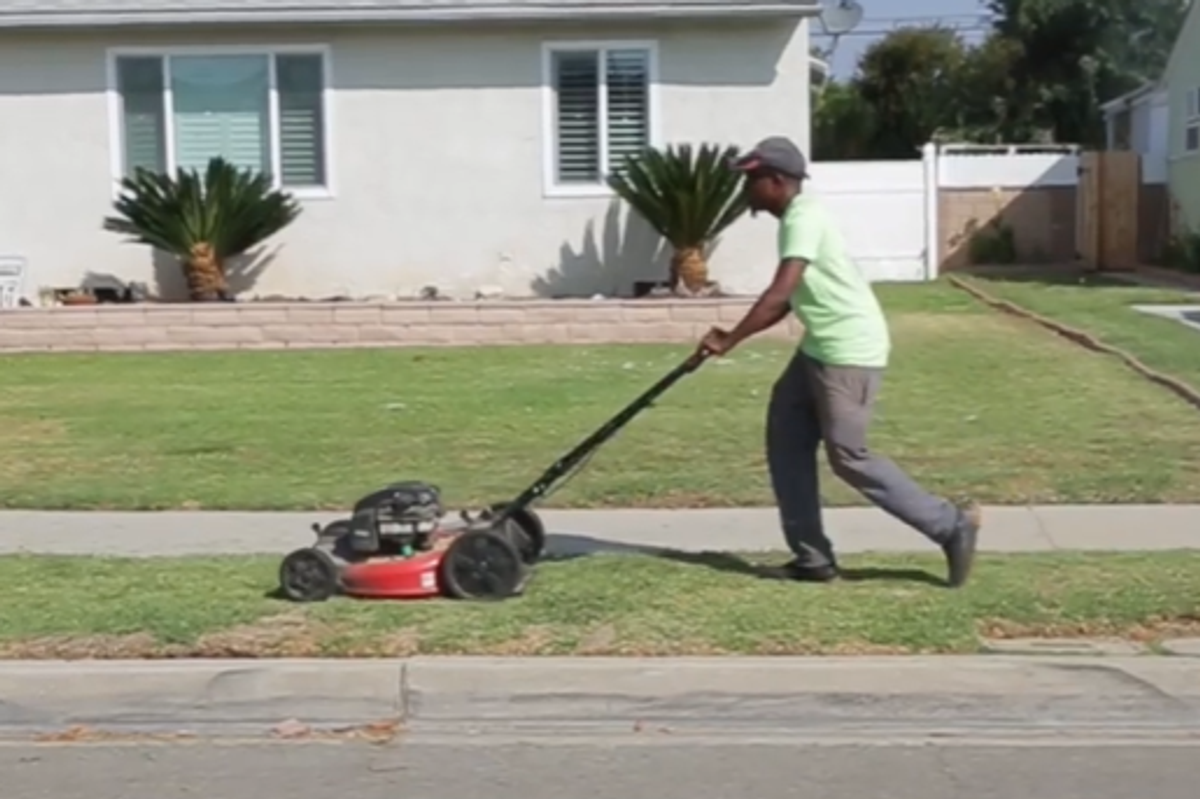11-year-olds mowed 50 lawns for free so the 'Lawnmower Man' donated gear to open a business
"These are good, hard-working kids that deserve some gratitude."
Rodney Smith Jr. mowing a lawn in West Covina, California
Rodney Smith Jr., of Huntsville, Alabama, was profiled by KMBC in 2023 for his generous donation to two 11-year-olds who completed his 50 Yard Challenge in Gadsden, Alabama. Ja’Torrian Taylor and Tevin Rice, founders of TJ & JT Mowing Service, completed Smith’s challenge to mow 50 yards for the elderly, veterans, and people unable to care for their lawns for free.
"I’m heading down to Gadsden right now. These are good, hard-working kids that deserve some gratitude," Smith, known as "The Lawnmower Man," told KMBC. Smith had been told that Taylor and Rice were sharing an old lawnmower that a neighbor had donated to them.
When he arrived, he gave both teens a mower, a blower, and a trimmer for their hard work, hoping they would use their new equipment to expand their business. "Giving these boys lawn equipment is teaching them discipline," Smith said. "If they tell someone they are going to mow a lawn, they need to mow the lawn."
"Remember, this is not the end; it’s just the beginning," Smith added. "This could be the beginning of a successful lawn service."
- YouTube www.youtube.com
Smith’s commitment to caring for people’s lawns began in 2015, and the following year he went viral for helping a 93-year-old woman who could no longer mow her lawn. The photo of Smith and the woman received over 1 million likes.
Five years ago, Upworthy profiled Smith for setting a bold goal of mowing lawns for free in all 50 states. His goal was to promote his initiative that "provides free lawn care to our elders, those who are disabled, single mothers, and our veterans, who do not have the time, resources, and/or money to manicure their yards."
As part of this goal, he created the 50 Yard Challenge, which has been a smashing success.
As of May 2023, 4,588 pre-teens and teens are participating in this challenge across the United States. If everyone completes the challenge, the total number of lawns mowed for free by Smith’s Raising Men & Women Lawn Care Service will reach 229,400.
Kids and teens can take part in the challenge by sending them a photo holding up a sign that says, “I accept the 50 Yard Challenge,” and in return, they’ll receive a white Raising Men/Women shirt along with shades and ear protection to get started. For every 10 lawns cut, they will get a new color shirt.
• 10 lawns earn an orange shirt
• 20 lawns earn a green shirt
• 30 lawns earn a blue shirt
• 40 lawns earn a red shirt
• 50 lawns earn a black shirt
The 50-Yard Challenge also promotes safe gardening. "This challenge is meant to be fun and also to help people, but first and foremost, like I said, safety comes first," Smith says. In the video, he and his friends explain why it's important for those who take the challenge to always wear safety equipment, ensure the lawn is cleared of debris, and wait until the lawn is dry before mowing.
- YouTube youtu.be
After completing the challenge, the child or teen will receive a mower, a blower, and a trimmer, just like Ja’Torrian Taylor and Tevin Rice from Alabama.
Smith’s story is an incredible example of how one good deed from a kind-hearted person can lead to an outpouring of kindness across the country. It also teaches young people the values of giving back, self-discipline, and entrepreneurship.
Learn more about Smith’s nonprofit and donate at Weareraisingmen.com.
This article originally appeared two years ago.

